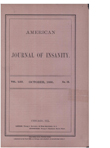Six-week, double-blind, placebo-controlled study of desipramine for adult attention deficit hyperactivity disorder
Abstract
OBJECTIVE: Despite the increasing awareness of attention deficit hyperactivity disorder (ADHD) in adults, there are a limited number of controlled pharmacologic studies of this disorder; most of the trials have focused on the psychostimulants. Because the tricyclic anti- depressant desipramine has been found to be effective in treating ADHD in pediatric groups, the authors tested its efficacy in adults with ADHD. METHOD: The authors conducted a randomized, 6-week, placebo- controlled, parallel-design study of desipramine at a target daily dose of 200 mg in 41 adult patients with DSM-III-R ADHD. They used standardized structured psychiatric instruments for diagnosis and, as the dependent variables (outcome), used separate assessments of ADHD, depressive, and anxiety symptoms at baseline and at each biweekly visit. RESULTS: There were highly significant differences in the reduction of ADHD symptoms between adults receiving desipramine and placebo. Within the desipramine-treated group, there were clinically and statistically significant differences between baseline and the week 6 end point for 1) reduction of 12 of 14 symptoms of ADHD and 2) decreases in the broad categories of hyperactivity, impulsivity, and inattentiveness. In contrast, placebo-treated patients showed no differences between baseline and end point for any of the ADHD symptoms assessed. According to strict, predefined criteria for response, 68% of desipramine-treated subjects and no subjects in the placebo group were considered positive responders. Response to desipramine was independent of dose, level of impairment, gender, or lifetime psychiatric comorbidity with anxiety or depressive disorders. CONCLUSIONS: These results, similar to findings in children and adolescents with ADHD, indicate that desipramine is effective in the treatment of ADHD in adults.
Access content
To read the fulltext, please use one of the options below to sign in or purchase access.- Personal login
- Institutional Login
- Sign in via OpenAthens
- Register for access
-
Please login/register if you wish to pair your device and check access availability.
Not a subscriber?
PsychiatryOnline subscription options offer access to the DSM-5 library, books, journals, CME, and patient resources. This all-in-one virtual library provides psychiatrists and mental health professionals with key resources for diagnosis, treatment, research, and professional development.
Need more help? PsychiatryOnline Customer Service may be reached by emailing [email protected] or by calling 800-368-5777 (in the U.S.) or 703-907-7322 (outside the U.S.).



